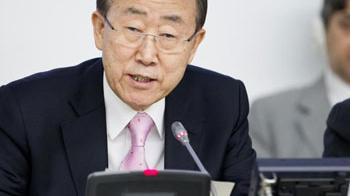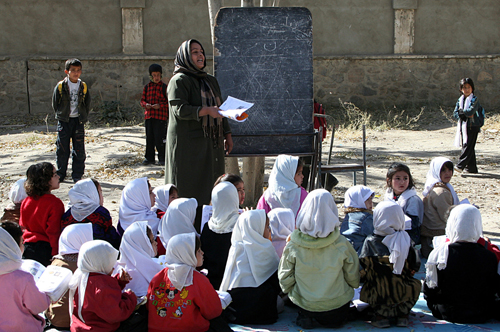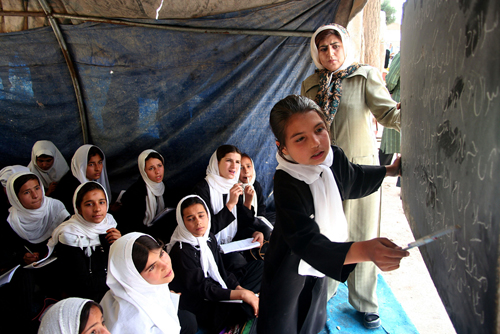NEW YORK - On the occasion of the International Day of the Girl Child, the United Nations Secretary-General, Ban Ki-moon, is calling for greater collaboration in efforts to invest in education so that girls can advance in their personal development and contribute to the world’s common future.“Empowering girls, ensuring their human rights and addressing the discrimination and violence they face are essential to progress for the whole human family. One of the best ways to achieve all of these goals is to provide girls with the education they deserve,” Mr. Ban said in his message for the Day, which falls on Friday, 11 October.
“Yet too many girls in too many countries are held back simply because of their gender,” he added. “To achieve meaningful results, we need fresh solutions to girls’ education challenges and we must heed the voices of young people.”
In a resolution adopted in December 2011, the UN General Assembly declared 11 October as the International Day of the Girl Child to recognize girls’ rights and the unique challenges girls face around the world.
This year, for its second observance, the theme is ‘Innovating for Girls’ Education’ – in recognition of the need for fresh and creative perspectives to propel girls’ education forward and in order to address the importance of new technology, innovation in partnerships, policies, resource utilization, community mobilization, and most of all, the engagement of young people themselves.
According to the UN, the fulfilment of girls’ right to education is first and foremost an obligation and moral imperative. In addition, there is overwhelming evidence that girls’ education, especially at the secondary level, is a powerful transformative force for societies and girls themselves: it is the one consistent positive determinant of practically every desired development outcome, from reductions in mortality and fertility, to poverty reduction and equitable growth, to social norm change and democratization.
While there has been significant progress in improving girls’ access to education over the last two decades, many girls, particularly the most marginalized, continue to be deprived of this basic right.
Girls in many countries are still unable to attend school and complete their education due to safety-related, financial, institutional and cultural barriers. Even when girls are in school, perceived low returns from poor quality of education, low aspirations, or household chores and other responsibilities keep them from attending school or from achieving adequate learning outcomes. The transformative potential for girls and societies promised through girls’ education is yet to be realized, the UN notes.
In Afghanistan, according to the UN Education, Scientific and Cultural Organization (UNESCO), despite positive changes in the education sector since the fall of the Taliban regime in 2001, three million Afghan children remain out of school. Of these, 70 per cent are girls.
In his message, the Secretary-General highlighted the Global Education First Initiative (GEIF) to accelerate progress in getting every child into school, especially girls.
“We are aiming to teach more than reading and counting; we are striving to raise global citizens who can rise to the complex challenges of the 21st century,” he said.
Launched in September 2012, the Initiative is a five-year project sponsored by the Secretary-General, which aims to generate a renewed push to achieve internationally-agreed education goals set for 2015 and get the world back on track to meeting its education commitments. The GEIF’s three priorities are: putting every child into school, improving the quality of learning and fostering global citizenship.
“I resolve to ensure that Global Education First mobilizes all partners to respond to their powerful call for empowerment,” Mr. Ban said, adding that, “More broadly, our campaign to reach the Millennium Development Goals by 2015 and shape a vision beyond that date must address the concerns and potential of the world’s girls.”
The Goals – launched by the UN in 2000 – aim to achieve eight development goals ranging from halving extreme poverty to halting the spread of HIV/AIDS and providing universal primary education by 2015. In 2010, the UN General Assembly initiated a post-2015 development plan.
Examples of possible steps the world body is urging on the Day – for UN agencies, Member States, civil society organizations and the private sector – include: improved public and private means of transportation for girls to get to school; collaboration between school systems and the banking industry to facilitate secure and convenient pay delivery to female teachers and scholarship delivery to girls; the provision of science and technology courses targeted at girls in schools, universities and vocational education programmes; corporate mentorship programmes to help girls acquire critical work and leadership skills and facilitate their transition from school to work; revisions of school curricula to integrate positive messages on gender norms related to violence, child marriage, sexual and reproductive health, and male and female family roles; and deploying mobile technology for teaching and learning to reach girls, especially in remote areas.








